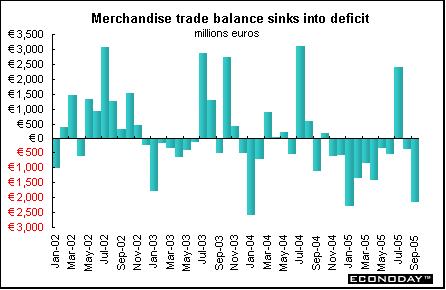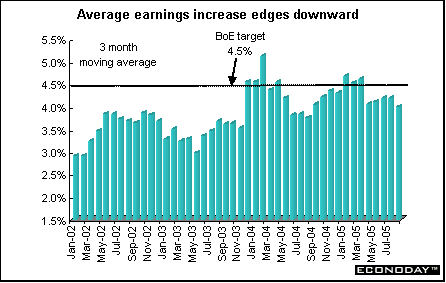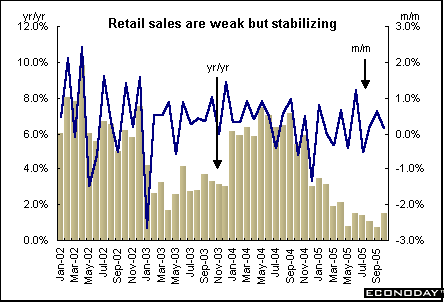After a sluggish start, equities picked up steam as the week progressed. By the close of business on Friday, all thirteen indexes tracked here were up on the week with many at four year highs. Mining and resources shares were among the best performing equity sectors this week with precious and base metals also contributing to the upside. Central bank rhetoric concerning policies in both Japan and Europe were the focus of currency traders. But they also paid close attention to U.S. Senate hearings of Federal Reserve proposed Chairman Ben Bernanke and his thoughts on inflation targeting. The Bank of Japan maintained its current zero interest rate policy while European Central Bank President Jean Claude Trichet gave the clearest indication yet that the ECB would increase EMU interest rates as soon as December 1, 2005.
Global Stock Market Recap

Europe and Britain
European and British shares wiped out October's losses and jumped to multi-year highs. Early in the week, higher crude prices lifted oil stocks which were the main driver of a rally. But stocks proved to be somewhat equivocal driven in turn by falling margins at companies such as Vodafone and uncertainty in U.S. trading. At the end of the week, some stocks benefited from declining oil prices. The lower prices eased investor concerns that energy costs may limit corporate profit growth for companies such as Bayer AG and Renault SA. European stocks continue to perform better than those in the U.S. Contributing factors are low interest rates combined with strong corporate balance sheets. Insurers climbed after Swiss Reinsurance Co. agreed to buy the insurance unit of General Electric Co. The company said it will issue new stock to finance the acquisition, a purchase that will allow it to be the world's largest reinsurer.

Bank of England Inflation Report cuts growth outlook
In its quarterly Inflation Report issued on Wednesday, the Bank of England lowered its forecasts for UK economic growth and inflation. The BoE said it expected inflation would be just below its 2 percent target two years from now. In its August report, the Bank expected inflation to be above target. Growth is expected to be about 3 percent by the middle of next year before easing in the first quarter of 2007. In August, it expected growth above 3 percent by 2007. Economic growth has slowed to a 12-year low, dragged down by faltering consumer spending and industry struggling to climb out of recession. The Bank of England lowered its interest rate in August to 4.5 percent and Governor Mervyn King told a press conference that it is reasonable to expect rates to be unchanged.
The pound sterling fell to its lowest against the dollar since December 2003 after the Bank of England cut forecasts for growth and inflation. The currency also extended a decline versus the euro. Comments spurred speculation that policy makers might consider cutting interest rates again after August's 25 basis point cut. The pound has declined almost 10 percent against the dollar this year, its biggest annual decline since 1992 when the currency dropped nearly 20 percent.
In September, 1992, international currency speculators forced the pound out of the Exchange Rate Mechanism - a system for tying the pound and other currencies' values to that of the now defunct German deutsche mark. The ERM required the pound to be within a band 6 percent above or below its peg of 2.95 deutsche marks. The ERM was phased out with the introduction of the euro on January 1, 1999. On what became known as "Black Wednesday", Chancellor of the Exchequer Norman Lamont raised the benchmark lending rate twice, from 10 percent to 15 percent, before lowering it to 12 percent in the same day. An analysis by the UK Treasury in 1997 calculated that the event cost the £3.3 billion in attempting to keep the pound in the ERM.

Asia/Pacific
It was a good week for stocks in the Asia/Pacific region. All were up one percent or more. Investors in exporters were particularly cheered by a robust U.S. industrial production report and declining oil prices. Profits at companies that rely on U.S. sales such as Toyota Motor Corp. were expected to benefit from solid U.S. growth. Friday's rally drove the Nikkei to the highest level since Junichiro Koizumi became prime minister on April 26, 2001, eclipsing the losses from his time in office. The Nikkei has rallied 92 percent from a low set two years ago.

This year's rally started in August, when economic reports showed accelerating growth and the Bank of Japan signaled more than seven years of deflation was near an end. Prime Minister Koizumi also called an election and the subsequent victory gave him a mandate to pass legislation to implement economic reforms. Koizumi is credited with reviving Japan's banks and property market following the economic stagnation caused by the bursting of the 1980s bubble economy. That in turn has helped bolster confidence among overseas investors that the economic recovery is sustainable.
Bank of Japan faces heightened political pressures
At its Monetary Policy Meeting, the Bank of Japan decided (by 7 to 2 vote) to maintain its current monetary policy. The BoJ will conduct money market operations aimed at the outstanding balance of current accounts held at the Bank at around ¥30 to 35 trillion and interest rates would remain at zero.

In the days preceding its Monetary Policy Meeting last week, the Bank of Japan was under attack from the Prime Minister who said it was too early for the Bank to change its deflation fighting policy. He put pressure on the Bank to keep flooding the economy with cash. BoJ Governor Toshihiko Fukui and the Monetary Policy Board had previously forecast that the country's seven-year deflation would end within this fiscal year which ends on March 31, 2006. This increased the possibility that the MPB would change its policy during the next fiscal year.
Comments by Koizumi and others highlight the government's concern that a change to the central bank's policy would prompt investors to dump bonds, raising yields and the cost of servicing the nation's debt, which is projected to reach 151 percent of gross domestic product by March. The bank has maintained current policy since March 2001 to help overcome deflation. It has set three conditions that must be met for a change - core consumer prices stop falling for at least a few months; policy makers are sure they won't resume sliding; and the bank is confident about the overall strength of the economy. Core prices have risen only in one month since April 1998.
The emergence of a possible dispute echoed a policy disagreement that occurred in 2000. The BoJ first adopted the zero rate policy in March 1999. It raised rates in August 2000 in the face of government opposition, saying the economy had recovered sufficiently to cope with higher borrowing costs. Seven months later it was forced to cut rates again and adopt the quantitative easing policy following the slump in global growth that accompanied the bursting of the Internet technology bubble.
The yen fell to fresh lows amid signs of an increasingly bitter political battle over the future of Japanese monetary policy. The yen fell to a 26-month low against the dollar after Prime Minister Junichiro Koizumi said it's premature for the Bank of Japan to stop flooding the banking industry with cash.

Currencies
The dollar continued to benefit from the interest rate differentials between the U.S. and Europe and Japan. During the week, the U.S. dollar hit a 27-month high against the yen and two-year peaks against the euro, sterling and the Swiss franc. On Wednesday, the dollar rose against both the euro and yen after a Treasury Department report showed foreign investors' purchases of U.S. financial assets surged to a record in September. A widening yield advantage for U.S. Treasury securities over European and Japanese debt has helped spur a rally against the euro and yen this year. The dollar fell for three years through December 2004 amid record trade and government budget deficits combined with the lowest interest rates in four decades that diminished the appeal of U.S. debt securities for international investors.

The euro rebounded on Friday after ECB President Jean Claude Trichet said the Bank is ready to increase interest rates after maintaining its key rate at 2 percent since 2003. Trichet's comments suggested the ECB will increase rates on December 1st. The ECB last raised the rate in October 2000, and its current 2 percent rate is a six-decade low. By contrast, the Federal Reserve has raised its comparable rate 12 consecutive times since June 2004, from a four-decade low of 1 percent to the current 4 percent. Higher rates make a country's debt securities more appealing to foreign investors, boosting demand for the local currency to buy the securities.
Indicator scoreboard
EMU - Third quarter flash gross domestic product was up 0.6 percent and 1.5 percent when compared with last year. Growth in Germany, France and Spain improved while Italy continued its anemic performance. As with all flash estimates, no detail is available. The EMU estimate is derived from data for Germany, Italy, Spain, France, the Netherlands, Finland, Belgium, Austria and Greece.

October harmonized index of consumer prices was up 0.3 percent and 2.5 percent when compared with last year. In October, prices were up for clothing, shoes and gas. These increases were offset by declines for telecommunication, package holidays, accommodation services and transport fuels. Energy prices continued apply inflationary pressures on the HICP when compared with last year. Prices for alcohol & tobacco, housing and transport prices also were up. Core HICP, which excludes energy and unprocessed foods was up 1.5 percent on the year. Eurostat announced that the HICP base year will be changed to 2005 from 1996 effective with January 2006 data.

September industrial production was down 0.4 percent but up 1 percent when compared with last year. Energy and capital goods output were up while intermediate, nondurable and durable goods were down. Output was up in France, Germany and Finland and down in the remaining EMU countries.

Germany - Third quarter flash gross domestic product was up 0.6 percent and 1.4 percent when compared with the same quarter a year ago. The better than expected result was attributed to net exports and increased investments. As with all flash releases, no detail is available.

November ZEW outlook index edged downward to 38.7 from 39.4 in October. The decline was attributed to the political uncertainty surrounding the formation of a new government under Angela Merkel and about the pace of economic reform. ZEW said that the positive factors influencing the index stemmed from lower oil prices, a more favorable euro/dollar exchange rate and the positive trend of new orders. The index is compiled by the Mannheim-based Center for European Economic Research (ZEW) based on the response of 326 German financial experts. They were asked for their opinions on current economic conditions and the economic outlook for major industrial economies between October 31st and November 14th.

October producer prices were up 0.7 percent and 4.6 percent when compared with last year. Excluding energy, the PPI was up 0.4 percent and 1.5 percent on the year. Overall energy prices were up 2 percent and 16 percent on the year.

France - Third quarter preliminary gross domestic product was up 0.7 percent and 1.8 percent when compared with the same quarter a year ago. The improved growth was fueled mainly by increased private consumption and improved business investment. Private consumption was up 0.7 percent and business fixed capital investment was up 1.1 percent. Both declined in the second quarter.

Italy - Third quarter preliminary real seasonally and workday adjusted gross domestic product was up 0.3 percent but was unchanged when compared with the same quarter a year ago. As with most first GDP estimates, no detail for components were available.

September seasonally and workday adjusted industrial production was down 1 percent and declined 1.6 percent when compared with the same month in 2004. Both output for consumer and industrial goods were down while output for intermediate and energy goods were up. Industrial output excluding construction, the measure favored by Eurostat was down 1 percent on the month and dropped 0.3 percent on the year.

September world merchandise trade deficit soared to €2.150 million from €386 million in August. The deficit in September 2004 was €1.137 million. Exports were up 5.5 percent but imports soared upward by 9.2 percent.

Britain - October consumer price index was up 0.1 percent and 2.3 percent when compared with last year. Gasoline prices were down as were food, beverages and miscellaneous goods & services. Other categories including alcohol & tobacco, recreation & culture as well as housing & household services and furniture & household goods were all up slightly on the month.

October producer output prices were down 0.1 percent but increased 2.6 percent when compared with last year. Core output prices excluding exclude food, petroleum, beverages and tobacco prices declined 0.3 percent and were up 1.3 percent on the year. Both scrap steel and food prices were down. Input prices were up 0.3 percent and 7.7 percent on the year. Fuel prices along with those of most other product groups were up while crude oil prices declined.

October claimant count unemployment rate remained at 2.8 percent despite a jump of 12,100 to a total of 890,100 in the number of unemployed - the highest level in almost two years. The International Labour Organisation unemployment rate for the three months ending in September remained at 4.7 percent. ILO employment was up by 123,000 with the participation rate climbing to 74.9 percent.

Average earnings for the three month to September were 4.1 percent higher when compared with the same months a year ago. Excluding bonuses, average earnings remained at 4 percent. Private sector earnings growth eased to 4 percent from 4.1 percent while public sector earnings growth declined to 4.2 percent from 4.5 percent. Both services and manufacturing earning were up 4.1 percent.

October retail sales volumes were up 0.2 percent and 1.5 percent when compared with last year. Both food and non-food sales were up 0.2 percent. Textiles, clothing and footwear was the only retail sector where volumes fell on the month, by 0.3 percent. The figures suggested that retailers may be achieving volume growth at the expense of profit margins, with average prices down 1.1 percent on a year earlier, the biggest decline since February.

Americas
Canada - September manufacturers' shipments edged down 0.5 percent but were up 1.5 percent when compared with last year. A hefty decline in motor vehicle manufacturing was partly offset by increases in the aerospace and chemicals products industries. Excluding the motor vehicle and parts industries, total manufacturing shipments increased at a reasonably healthy pace of 0.6 percent. Only 10 of 21 industries accounting for just over half of the total value of shipments posted decreases. The volatile transportation equipment sector was the main reason for the plunge in shipments. Seasonal shutdowns and extended production slowdowns at some plants have contributed to the recent volatility of the motor vehicle industry. Unfilled orders edged 0.1 percent higher for the seventh successive increase. Widespread increases in unfilled orders were reported by the machinery and railroad rolling stock industries, which offset a decline in the aerospace products and parts industry. New orders sank by 1.7 percent. Again the transportation equipment sector was responsible for the decrease. Excluding this sector, new orders were up 0.2 percent in September.

Bottom line
Japanese monetary policy is caught in a tug of war between politicians including Prime Minister Koizumi and his policy chief Hidenao Nakagawa and policy makers at the Bank of Japan. While BoJ Governor Toshihiko Fukui affirmed on Friday that the Bank's policy may change in next fiscal year that begins April 1, 2006. He said he wants to restore the role of interest rates in managing the economy, which is heading for its longest sustained expansion in eight years. Koizumi responded this week by saying it's too soon to stop fighting deflation, and his policy chief Hidenao Nakagawa said the bank "has no independence."
Meanwhile, according to ECB President Jean Claude Trichet, the Bank's Governing Council is ready increase rates as soon as December 1st. Expectations for a rate increase grew after third quarter economic growth accelerated.

